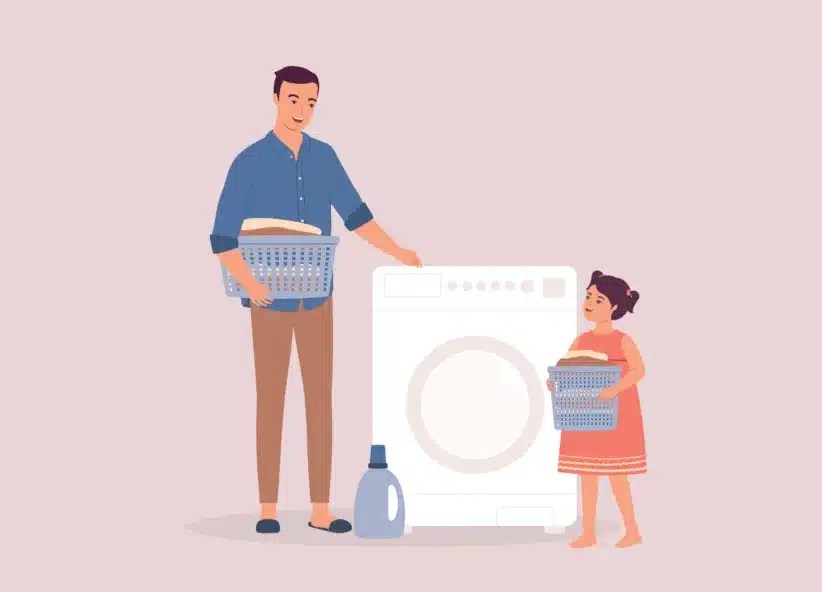
Millennial Dads: Renegotiating Manhood for Father’s Day
A group of Millennial mom friends gathered at a local New York bar to reclaim Mother’s Day. Weary from a day creating family magic for our children, each woman escaped during bedtime, leaving the fathers to manage the children’s nighttime shenanigans. Lamenting the laundry they folded, the tantrums they managed, and the help their husbands needed to locate the whisk, each still felt confident in her husband’s capability to run the show. Today’s Millennial dads are able parents–not sometimes babysitters. Unlike previous generations with clearly defined roles for the nurturing homemaker mother and detached breadwinner father, American dads born between 1980 and 1996 are rolling up their sleeves to participate in the manual labor of raising children.
While women still carry more of the burden of domestic life, according to Pew Research, today’s dads “spend more time engaged in housework and child care than they did half a century ago.” The Pew report inspired optimistic media headlines that boasted, “young fathers have nearly tripled their time with their children since 1965. Millennial men who live with a spouse and children are the most engaged fathers of any prior generation. Young working dads even report an “equal desire to be at home raising children, while facing the same historic demand to provide financially for the household.” Today’s work-from-home policies blur the lines between professional and home life, causing working fathers and mothers alike to struggle to find balance. Much has been written about women’s struggle to have it all. This Father’s Day, I want to shift the narrative to the Millennial man. In my exploration for this spotlight, I quickly learned that the improvement in paternal engagement is encouraging, but does not tell the whole story of growing up male in America today. Diverse and evolving concepts of gender and family forms make modern manhood complicated. If, like me, you are raising little boys today to be the good fathers of tomorrow, read on to understand the challenge of parenting in a world of rapidly evolving rules and expectations.
The Curious Case of the Childless Millennial
While Millennial dads living with their kids are more active parents, according to a 2020 Pew Report, “only one third of American Millennial men live with a spouse and children.” Fewer Millennials are having children at all, let alone living with them. Compared with 66% of Gen Xers in 2003, 69% of Boomers in 1987 and 85% of the Silent Generation in 1968, only 55% of Millennial men and women live with a family of their own.
As a result, both male and female Millennials reside in more diverse living arrangements than past generations. With the age of marriage and parenthood rising, the rate of cohabitation with an unmarried romantic partner is higher for Millennials than other generations. A more striking household shift comes from the percentage of grown men living at home with their parents. In 2023, 18% of Millennial men still live with their parents, compared with 10% of women–a higher share of the population than any other generation when in their 20s and 30s. When demographic data on race and educational attainment are considered, the trend is even more stark. Millennial men without a college degree are especially likely to fall into this category (21%, compared with 12% of Millennial men with a bachelor’s or higher degree).
The decline of men living with a spouse and child juxtaposed with the rise of men living with their family of origin set my spidey senses flaring. The Millennial men who opt into parenthood are more deeply engaged than ever before, but a significant portion of men aged 28 to 42 are still sleeping in their childhood beds. Houston, do we have a problem?
Psst…Google Announces First Kids Smart Watch: Fitbit Ace LTE (and we are loving for our city kids)
Nature vs. Nurture
In my quest to understand the diverse experience of Millennial dads, I sought insight from Cornell University’s Psychology professor Michael Goldstein. Specializing his research in parent engagement, which he defines as how humans respond to infant behaviors, Goldstein identified a difference in the way mothers and fathers relate to parenting. In studies conducted in the late 1990s, Goldstein observed men and women consistently reported different demand characteristics, the subject’s impressions about what the study is about. When men entered the lab, they were nervous, assuming the study was about them and their parenting competence. In contrast, the women thought that the studies were about the baby. Asked why he thought the parents differed in their response to the parent engagement studies, Goldstein opined that girls and boys are raised with different messages about caregiving. Little girls are taught to be mother’s helpers, learning to hold the bottle and tend to the baby. The messaging to newly minted big brothers is that babies are fragile and could be hurt by high energy boys. While boys and girls’ energy levels do not differ biologically, the message demonstrates a profound difference in how we raise boys and girls to be caregivers.
Armed with this insight, I next sought perspective from Jett Stone, with a PhD in clinical psychology and a practice focused on men’s issues, Stone is literally writing the book on boyhood. Asked whether men and women are biologically different in their capacity to parent, Stone states “there is biology, but biology isn’t destiny.” More important is how men are socialized to be parents – or not. In his practice, Stone observes the Millennial men in his practice to be “anxious or unhappy in their co-parenting relationship, but unable to articulate why.” When nudged to go below the surface, we discover a common pattern of men who feel fatherhood is a “performance” with the wife as director. They fear failure in the role, but do not realize that they haven’t had the same role models or lifetime of rehearsal for fatherhood that women experience in relational play.
Moreover, Millennial men, raised during the divorce boom of the 1980s and 1990s often didn’t have a positive male role model at all, let alone one that presented a roadmap for an engaged working father. In Stone’s Connecticut and New York practice, he observes that most Millennial men never prepared for the idea of parenthood until their partners became pregnant, but they are motivated to set a new precedent of what fatherhood looks like.” Men want to care for their children in a way that their fathers and grandfathers would not consider. Today, fathers parent in dual earning families or where mothers are the primary breadwinner. The change in family structure creates a constant negotiation of household tasks and a culture shock for Millennial dads who must redefine what it means to be an engaged father.
Asked what mothers can do to help their husbands or co-parents grow into an engaged father, Stone advises to put aside the mom juggle for a moment. Undeniably, women are carrying a huge load, but to have a productive conversation about the shared experience of parenthood, focus on the balancing act of fathering. Stone, a certified Fair Play Facilitator, uses Eve Rodsky’s method to help couples navigate daily caretaking negotiations with empathy and respect. He encourages mothers to “put aside perfection and let fathers develop confidence and competence by giving them space to parent in their own style.” Many new dads shut down and defer to mom because they appear to know more. Becoming comfortable with a partner doing things differently gives mom the space she craves and children the necessary model for engaged fatherhood.
The Masculinity Crisis in a Girl Boss Era
As Millennial parents rewrite the script on fatherhood, my thoughts return to the two thirds of the generation currently delayed in raising the next. When asked to weigh in on the other side of the Millennial fatherhood story, Stone’s discussion turns to his experience working with Veterans. His early work with the Veterans Association shifted his professional focus to the experience of manhood. In practice with men traumatized from war, he became intimately aware of the current crisis of masculinity. In contrast to the positive attention given to girls during the four waves of feminism, there is something bleak about masculinity. Today’s men are facing a complex reckoning with dominance and fragility. While the feminist movement champions girls to be anything they want, today’s boys grow up with the mixed message that masculinity is a liability, but don’t be a sissy. The relaxing of gender norms that helps men step into the role of engaged father simultaneously feels like an attack to men who no longer fit in today’s world or workforce.
In response to my query about Millennial absence in parenthood, Stone describes an “ambition gap.” As he puts it, “it takes motivation to want to go to college, get married and have kids.” On the conservative right, there is a sense that masculinity is maligned and that education strips men of their masculinity. Men suffer in an educational system that demands focused desk work from children who are not yet developmentally up to the task. As Stone concedes, “boys brains develop differently than girls brains.” Girls, better equipped for school at a younger age, are conditioned to have it all. In contrast, boys struggling to fit within the school paradigm are deficient. In generations past, when girls were succeeding in school, the expectation was still that they’d be a mother or maybe a secretary or teacher. Now, their dreams are bigger. As more women go to college and enter prestige jobs, their male classmates feel left behind and outside of the modern workforce. Women want to date men who are equal in education or socioeconomic status. These men feel unseen and out of their league. Like new Millennial fathers, these men lack a sense of identity and a roadmap for where they belong in the world.
A Work-in-Progress
Boys and men are still figuring out how to contribute to modern society. When considering the difference between the third of men who are live-in fathers and the two thirds that are not, access to education and high earning potential drive ambition to parent. Once in the role of dad, men can shut down from the struggle to be multidimensional as a provider and caregiver in a way that they weren’t socialized before. For the two thirds of men currently outside of parenthood, time will tell. For men cynical about the future of manhood there is risk of withdrawal and numbing. How do we bring boys and men back from retreat? Stone says it begins with discussion. In his practice, Stone helps men talk about these issues with humor and empathy. He says, “men have a round about way to get to vulnerability, but once you get them talking, we can help to redefine their sense of purpose and identity in a rapidly changing world.
Finally, to the men of my generation that are changing diaper blowouts and waking up with cranky babies in the middle of the night, I want you to know that I see you. I see you cooking dinner and putting your dishes in the sink (consider the dishwasher?). I see you brushing baby teeth and washing little hands (consider clipping their nails?). I see you playing with dolls, wrestling on the floor and reading Goodnight Moon. I see you showing up every day at work and at home. I see you building the bridge as you run, creating a new model for parenthood for the next generation of men as you raise them without a script. And I am here for that.
























